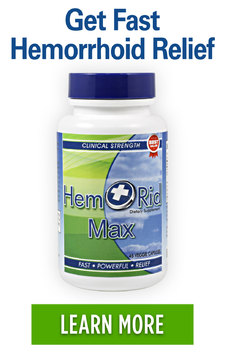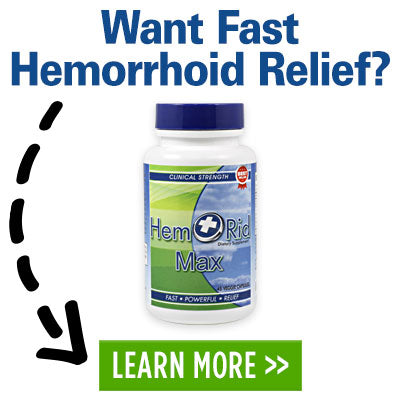Prolapsed Hemorrhoids Guide - How To Treat Prolapsed Internal Hemorrhoids
Posted on 02 February 2018 by Maryanne Johnson
Share this post
Prolapsed hemorrhoids are a common condition caused by the protrusion of internal hemorrhoids outside of the anus. While internal hemorrhoids are not usually seen or felt, this is not true of prolapsed hemorrhoids.
Some patients feel that prolapsed hemorrhoids are cause for concern. They are not generally dangerous. There are many stages of prolapsed hemorrhoids, so let’s take a closer look.
What Is a Prolapsed Internal Hemorrhoid?
Prolapsed hemorrhoids are a form of internal hemorrhoid that has gotten to the stage where it protrudes out of the rectum. Hemorrhoids are groups of veins that provide a cushion to support the muscles of your anus.
While all hemorrhoids are somewhat swollen, serving their purpose of helping to keep your stool from leaking, some hemorrhoids may become swollen more than normal.
This is where hemorrhoids become symptomatic. Hemorrhoids are either internal or external. A prolapsed hemorrhoid is characteristic of an internal hemorrhoid.
Internal hemorrhoids are classified based on their level of protrusion. Prolapsed internal hemorrhoids are not often painful, but can cause a feeling of discomfort. Prolapsed internal hemorrhoids are classified into one of four grades. This hemorrhoid pain guide can help you deal with painful hemorrhoids.
Want to get real relief from hemorrhoids? Try this doctor recommended all-natural hemorrhoid supplement.
Grade one internal hemorrhoids do not protrude in the anal canal, but may display symptoms of bleeding. Grade II prolapse out of the anal canal during exertion, such as a bowel movement, but retract back inside on their own.
Grade III internal hemorrhoids protrude during exertion or bowel movements but need to be manually pushed back inside the rectum. Grade IV internal hemorrhoids are the worst case. These have prolapsed out of the anal canal and cannot be pushed back in manually. They remain outside of the rectum and generally require more advanced treatment.
Youtube Video on Internal Prolapsed Hemorrhoids
The most common symptoms of prolapsed internal hemorrhoids include:
- Hemorrhoid bleeding most commonly occurs during bowel movements. The blood may be noticeable in the stool, the toilet bowl, or the toilet paper once you wipe. The blood is bright red in color.
- Hemorrhoid itching inside or around the anus.
- A feeling that you need to have a bowel movement or haven’t completed your bowel movement, although this is not the case.
- If a prolapsed internal hemorrhoid becomes thrombosed, pain may occur.
- An irritating mass that protrudes out of the rectum, but can often be pushed back in manually.
Prolapsed internal hemorrhoids are often self-diagnosed. If you are unsure whether you have a prolapsed internal hemorrhoid, or you become concerned about your symptoms, a rectal examination can be performed by your hemorrhoid doctor or physician.
What Causes Prolapsed Hemorrhoids?
When internal hemorrhoids become more severe, they may prolapse. Hemorrhoids are caused when the rectal veins in the anal canal become swollen. In general, the most common causes of hemorrhoids include:
- Pregnancy
- Obesity
- Constipation
- Poor diet without much fiber
- Straining during bowel movements
- Sitting or standing for too long
- Physical labor, particularly labor that causing straining
- Chronic diarrhea
- Strain or exertion from sneezing, coughing, or vomitting
When internal hemorrhoids become significantly enlarged, they can become prolapsed. Once internal hemorrhoids swell to the point that they protrude out of the rectum, they are prolapsed.
Top Types of Prolapsed Hemorrhoids Treatment
For most patients, focus on self-care is enough to reduce prolapsed hemorrhoids. And, in many cases, prolapsed hemorrhoids can reduce on their own. Self-care hemorrhoid treatments include sitz baths, ice packs, and over-the-counter remedies such as hemorrhoid creams, ointments, wipes, and anti-inflammatory medications.
In addition to taking measures to treat the area of the prolapsed hemorrhoid, treatment can include improving your bowel habits. Avoid straining during bowel movements and make changes in your diet to keep your stool soft.
Increasing your daily fiber and water intake can help move your bowels easily and often. There are also many fiber supplements and stool softeners available to help avoid constipation.
For grade IV prolapsed hemorrhoids, medical treatment may be required. Grade IV prolapsed hemorrhoids do not reduce on their own. Especially ones that are re-occurring, some prolapsed hemorrhoids will require a visit to your medical provider.
A hemorrhoid doctor will evaluate your prolapsed hemorrhoid and weigh the severity of your symptoms with your medical history to determine your treatment option.
Minimally invasive methods of treatment can be performed in a doctor’s office without anesthesia. The most common is the rubber band ligation. The rubber band ligation involves the placement of a small, tight band around the base of the hemorrhoid.
A study from the International Surgery Journal showed that "82.81% patients were free from symptoms at 1 year after treatment" with the use of suture ligation (1).
This cuts off the blood supply and causes the prolapsed hemorrhoid to die off. There are other treatment options available, including surgical treatment, but they are not as common as those listed above.
Sclerotherapy is another option that has shown to eliminate hemorrhoids in clinical studies (2).
We have reviewed many different hemorrhoid products. Take a peak at the reviews below to see which product you should order for hemorrhoid relief.
HemRid is a very popular supplement for hemorrhoid relief.
How to Treat Prolapsed Hemorrhoids at Home
The good news for patients who suffer from prolapsed hemorrhoids is that most can be treated at home. At-home treatment methods focus on self-care. To reduce the swelling of prolapsed hemorrhoids, sitz baths and ice packs are helpful.
When you sit in a few inches of warm water, or apply an ice pack, for fifteen minutes, swelling and irritation can be greatly reduced. Our home remedies for hemorrhoids post will help you figure out how to treat hemorrhoids at home.
What is the best OTC medicine for hemorrhoids? Over-the-counter at-home treatments can also help prolapsed hemorrhoids from the comfort of your home. These include creams, ointments, suppositories, and wipes that have anti-inflammatory and/or astringent properties.
For continued reduction of prolapsed hemorrhoids, or to prevent their recurrence, lifestyle changes can help. Eating a diet that delivers the right daily fiber intake can help keep your bowel movements regular and help move your bowels easier. Proper hydration is also important.
Another very important habit to follow at home for prolapsed hemorrhoids involves your bowel movements. Avoid straining during bowel movements. Do not sit on the toilet for extended periods of time.
If you continue to have problems with constipation or difficult bowel movements, especially if your prolapsed hemorrhoid is blocking the passage of stool, try using a stool to elevate your feet when you have a bowel movement.
Best Prolapsed Hemorrhoid Surgery Options
There are surgical options available to treat grade IV prolapsed hemorrhoids. When prolapsed hemorrhoids cannot be manually pushed back into place, surgery is often needed.
Minimally invasive options are available to treat prolapsed hemorrhoids. These can be done at a doctor’s office and involve cutting off the blood supply to your hemorrhoid to rid you of the problem. The most common is the rubber band ligation.
In severe cases, surgery under anesthesia may be necessary. The most common surgery to treat prolapsed internal hemorrhoids is the hemorrhoidopexy. This is commonly referred to as stapling.
Performed in a hospital, hemorrhoidopexy is also referred to as a procedure for prolapse and hemorrhoids (PPH). During the surgery, a medical-grade stapler is used to attach the prolapsed hemorrhoidal tissue in place on your rectal wall.
The blood flow is cut off to the hemorrhoids and your anal tissue will shrink back into place. This surgical procedure has a high success rate and is less painful than other hemorrhoid surgeries, like the hemorrhoidectomy.
Can You Push an External Hemorrhoid Back In?
No, an external hemorrhoid is not something that has fallen out of place that needs to be pushed back in, it is a result of swelling and inflammation of the veins located below the skin's surface.
If you try to push on the external hemorrhoid's surface forcefully, you will only feel sharp twinges of pain and further irritate it.
Can a Prolapsed Hemorrhoid Go Away on Its Own?
There are many cases where a prolapsed hemorrhoid does go away on its own. Grade II and grade III prolapsed hemorrhoids often resolve on their own.
Grade II prolapsed hemorrhoids spontaneously retract back into the rectum and often resolve on their own. While grade III prolapsed hemorrhoids need to be manually pushed back inside the rectum, they also can spontaneously go away on their own.
Would you like help with your hemorrhoids? Click the image below to learn more about the #1 hemorrhoid supplement, HemRid.
This premium herbal supplement is recommended by physicians, made in the USA in a FDA registered facitlity, and comes with a full 120-day guarantee.
The only prolapsed hemorrhoid that has not been known to go away on its own is the grade IV prolapsed hemorrhoid.
Prolapsed Hemorrhoid Pain Relief Options
Prolapsed hemorrhoids are not generally accompanied by pain unless they become thrombosed or strangled. If you are experiencing pain from prolapsed hemorrhoids, there are many pain relief options available. These include:
- Warm sitz baths or soaks for fifteen minutes, three to four times a day
- Application of ice packs to relieve swelling and numb the pain (3)
- Pain relievers such as acetaminophen and ibuprofen
- Rinsing off after a bowel movement or the use of moist wipes or medicated pads to avoid further irritation from wiping, such as Tucks
- Numbing ointments, pain relieving creams, or witch hazel
- Avoidance of heavy lifting and/or straining
- For severe cases, or flare-ups, staying off your feet and bed rest can greatly reduce swelling and pain associated with swelling






0 comments